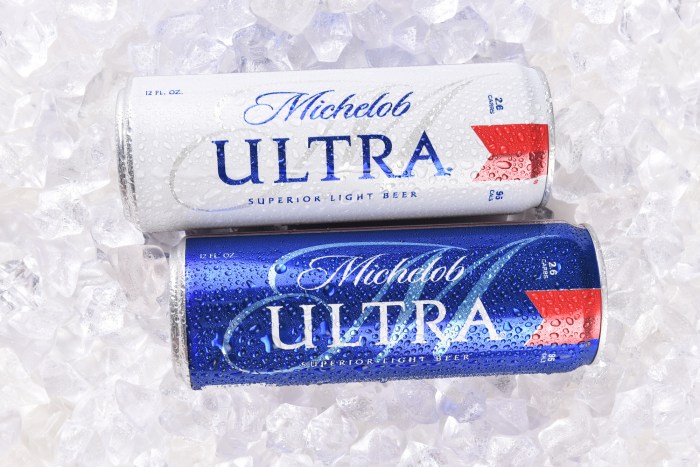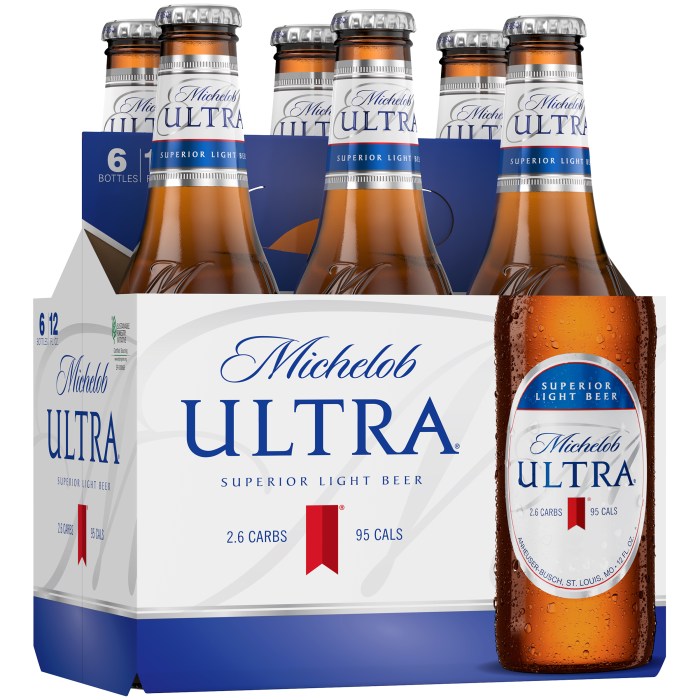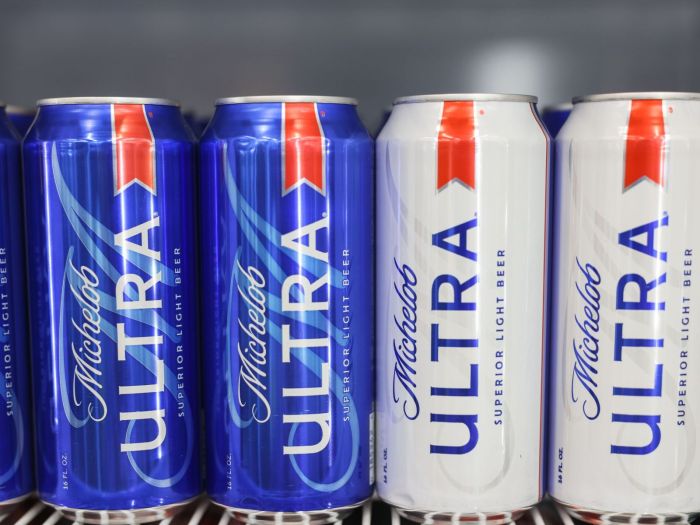Michelob Ultra Nutrition Facts A Detailed Analysis
Michelob Ultra Ingredients and their Impact: Michelob Ultra Nutrition Facts

Michelob ultra nutrition facts – Michelob Ultra’s popularity stems partly from its marketing as a lower-calorie, lower-carbohydrate beer. Understanding its ingredients and their effects is crucial for consumers making informed choices about their beverage intake. This section will examine the key components of Michelob Ultra, analyzing their nutritional contributions and potential health implications.
Michelob Ultra’s ingredient list typically includes water, barley malt, rice, hops, and yeast. While seemingly simple, the specific proportions and processing methods influence the final product’s nutritional profile and potential health impacts.
Michelob Ultra Ingredient Breakdown and Nutritional Contributions
Let’s delve into the individual components and their nutritional roles. Water forms the bulk of the beer, contributing minimal calories and nutrients. Barley malt provides carbohydrates, primarily in the form of maltose and glucose, which contribute to the beer’s sweetness and caloric content. Rice, often added to light beers, contributes to a lighter body and potentially reduces the carbohydrate count compared to beers made solely with barley malt.
Hops add bitterness and aroma, and contribute negligible calories or nutrients. Yeast plays a crucial role in fermentation, converting sugars into alcohol and carbon dioxide. The specific yeast strain used can influence the final flavor profile.
Potential Health Implications of Michelob Ultra Ingredients
The health implications of consuming Michelob Ultra, like any alcoholic beverage, are multifaceted and depend on individual factors such as consumption levels and overall health. The following points Artikel potential positive and negative impacts:
- Positive Impacts (Moderate Consumption): Some studies suggest moderate alcohol consumption may be associated with a reduced risk of cardiovascular disease, although this remains a complex and debated topic. The low calorie and carbohydrate content of Michelob Ultra might be seen as beneficial for individuals managing their weight, compared to higher-calorie alternatives.
- Negative Impacts (Excessive Consumption): Excessive alcohol consumption is linked to numerous health problems, including liver damage, increased risk of certain cancers, and negative impacts on mental health. Even moderate consumption can interfere with sleep quality and increase the risk of accidents. The low calorie nature of Michelob Ultra should not encourage excessive consumption.
Comparison to a Non-Light Beer
Compared to a typical non-light beer, such as a standard lager or IPA, Michelob Ultra generally has significantly fewer calories and carbohydrates. This difference stems primarily from the use of rice in addition to barley malt, and potentially different fermentation processes. Non-light beers typically contain more barley malt, resulting in a higher carbohydrate and calorie content, and often a fuller, richer flavor.
The potential impact is that while a non-light beer might provide a more satisfying sensory experience, it will contribute more significantly to overall caloric intake. A direct comparison would require analyzing specific nutritional information for both the light and non-light beer in question, as ingredient proportions and brewing methods vary across brands.
Michelob Ultra’s nutritional profile is often lauded for its lower calorie count compared to other beers. However, understanding the nutritional impact of your entire diet is key, and that includes considering alternative snacks. For instance, comparing the macronutrients is useful, so you might want to check out a resource detailing rice cakes nutrition facts to see how they stack up against the carbs and calories in your favorite brew.
Returning to Michelob Ultra, remember to always check the specific nutritional information on the label for the most accurate data.
Michelob Ultra and Dietary Considerations

Michelob Ultra’s low-calorie and carbohydrate content make it a consideration for individuals following various dietary plans focused on weight management or specific macronutrient restrictions. However, it’s crucial to understand its nutritional profile within the context of broader dietary goals and individual health needs. This section explores how Michelob Ultra integrates with popular diets and its potential effects on blood sugar levels.Michelob Ultra’s suitability for different diets hinges primarily on its relatively low calorie and carbohydrate content.
For low-carb diets, such as ketogenic diets, the low carbohydrate count per serving can be beneficial, allowing individuals to remain within their daily carbohydrate limits while enjoying an alcoholic beverage. For weight management diets, the low calorie count contributes to a lower overall caloric intake, potentially aiding in weight loss efforts. However, it’s important to remember that alcohol consumption should always be moderate and integrated into a balanced diet and exercise plan.
Excessive alcohol intake, regardless of the beverage type, can negate the benefits of any weight-loss strategy.
Michelob Ultra’s Impact on Blood Sugar
The impact of Michelob Ultra on blood sugar levels is relatively modest compared to other alcoholic beverages due to its lower carbohydrate content. However, alcohol can still affect blood sugar levels indirectly. Alcohol can interfere with the liver’s ability to regulate glucose, potentially leading to both hypoglycemia (low blood sugar) and hyperglycemia (high blood sugar) depending on individual factors and the amount consumed.
Individuals with diabetes should consult their healthcare provider before incorporating Michelob Ultra or any alcoholic beverage into their diet, to assess its potential impact on their blood sugar control plan and medication regimen. Careful monitoring of blood sugar levels is advised after consuming alcohol, regardless of the type of beverage.
Michelob Ultra Nutritional Profile Compared to Recommended Daily Intake
The following table compares the nutritional profile of one 12-ounce serving of Michelob Ultra to the recommended daily intake (RDI) of various nutrients for an average adult. Note that RDIs can vary based on age, sex, activity level, and overall health. This table provides a general comparison and should not be used as a sole source of dietary guidance.
Always consult a healthcare professional or registered dietitian for personalized dietary advice.
| Nutrient | Michelob Ultra (12 oz) | Recommended Daily Intake (Approximate) | Percentage of RDI (Approximate) |
|---|---|---|---|
| Calories | 95 | 2000-2500 (varies widely) | ~4% |
| Carbohydrates | 2.6g | 130-300g (varies widely) | ~1% |
| Protein | 0g | 46-56g | 0% |
| Fat | 0g | 44-78g | 0% |
Michelob Ultra vs. Other Beverages

Understanding how Michelob Ultra stacks up against other beverages, both alcoholic and non-alcoholic, is crucial for making informed choices about your diet and overall health. This comparison will highlight key nutritional differences, helping you assess its place within a balanced lifestyle.
Comparing Michelob Ultra to other drinks requires looking at both its alcoholic and non-alcoholic counterparts. The nutritional profile of alcoholic beverages varies significantly, while non-alcoholic options offer a range of caloric and nutritional content.
Michelob Ultra Compared to Other Alcoholic Beverages, Michelob ultra nutrition facts
Michelob Ultra distinguishes itself from many other alcoholic beverages due to its lower calorie and carbohydrate content. This comparison illustrates the differences.
- Michelob Ultra: Typically around 95 calories and 2.6g carbohydrates per 12-ounce serving.
- Wine (5-ounce serving): Calorie content varies greatly depending on the type of wine, ranging from approximately 100-150 calories and containing varying amounts of carbohydrates and sugar.
- Spirits (1.5-ounce serving): Generally high in calories, typically around 97 calories for vodka, 100 calories for rum, and more for liqueurs, with minimal carbohydrates.
- Beer (12-ounce serving): Other beers can contain significantly more calories and carbohydrates than Michelob Ultra, often ranging from 150 to 250 calories or more.
Michelob Ultra Compared to Non-Alcoholic Beverages
Michelob Ultra’s nutritional profile also stands in contrast to various non-alcoholic drinks. This section details these differences.
- Water: Contains zero calories and carbohydrates, and is essential for hydration.
- Juice (8-ounce serving): Calorie and sugar content varies significantly depending on the type of juice, often ranging from 100 to 150 calories and containing a high amount of natural sugars.
- Soda (12-ounce serving): Typically high in calories and sugar, with little to no nutritional value, usually containing between 140 to 150 calories and a significant amount of added sugar.
Michelob Ultra’s Relative Nutritional Value Compared to Other Low-Calorie Beverages
A bar graph visualizing the relative nutritional value of Michelob Ultra against other low-calorie beverages would provide a clear comparison. The graph would show Michelob Ultra’s calorie and carbohydrate content in comparison to other low-calorie options like light beers, diet sodas, and unsweetened iced tea. The vertical axis would represent calories, and the horizontal axis would represent the different beverages.
Michelob Ultra’s bars would likely fall somewhere in the middle, showing it as a moderately low-calorie option compared to the extremes of water (very low) and some other alcoholic beverages (very high).
Essential FAQs
Does Michelob Ultra contain gluten?
Yes, Michelob Ultra contains gluten as it is made from barley.
Is Michelob Ultra suitable for a vegan diet?
Generally, yes, as long as the manufacturing process hasn’t involved any animal products, but always check the label for specific ingredients and potential cross-contamination.
How many carbs are in a 12-ounce bottle of Michelob Ultra?
This information can vary slightly depending on the batch but generally falls within a low range, usually around 2.6 grams. Check the current nutrition label for the most accurate information.
Does drinking Michelob Ultra affect sleep?
Alcohol consumption, including Michelob Ultra, can disrupt sleep patterns, particularly if consumed close to bedtime. Moderation is key.
Can I drink Michelob Ultra if I’m trying to lose weight?
While it’s lower in calories than many other beers, alcohol consumption should be considered within the context of a broader weight-management plan, as it can still contribute calories.
